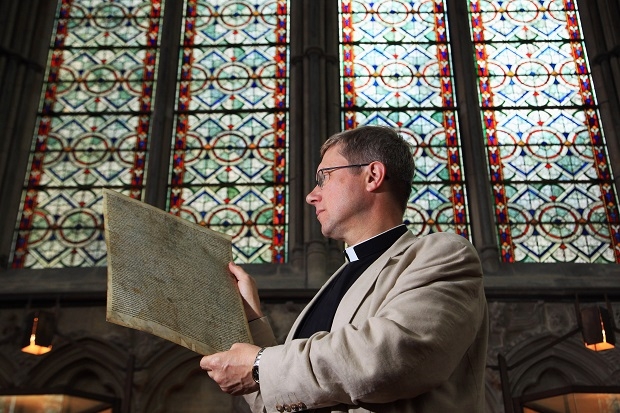Was anyone terribly surprised by the Social Attitudes Survey published today suggesting that most people thought that, in order to be British, you should be able to speak English? Some 95 per cent thought so; the only curiosity being that in 2006 the figure was as low as 86 per cent. Nor indeed is it terribly odd that, as the authors point out, the threshold for Britishness is getting higher. As the survey from January points out, three in four people think immigration numbers should be reduced; the question of identity has to be seen in that context.
One interesting aspect of the survey is the decrease in the numbers of people who think Christianity is an important component of Britishness – fewer than a quarter do so, down from 32 per cent in 1995 – or nearly a third. Now obviously, Christianity can’t be a pre-requisite for Britishness but the larger question is whether it’s an important component of the culture. I think it’s self-evident that it is: prior to the Reformation, as a Catholic culture, after it, as a generally Protestant one. And, since the PM was obliging enough to pin British values to Magna Carta last week, it’s worth taking a look at the very first bit of the text, the preamble, which is stuffed with references to God and his church, and the first article, which is to do with the freedom of the church – with which, unfortunately, Henry VIII played fast and loose.
Here’s a translation of the first bit:
‘Preamble: John, by the grace of God, king of England, lord of Ireland, duke of Normandy and Aquitaine, and count of Anjou, to the archbishop, bishops, abbots, earls, barons, justiciaries, foresters, sheriffs, stewards, servants, and to all his bailiffs and liege subjects, greetings. Know that, having regard to God and for the salvation of our soul, and those of all our ancestors and heirs, and unto the honor of God and the advancement of his holy Church and for the rectifying of our realm, we have granted as underwritten by advice of our venerable fathers, Stephen, archbishop of Canterbury, primate of all England and cardinal of the holy Roman Church, Henry, archbishop of Dublin, William of London, Peter of Winchester, Jocelyn of Bath and Glastonbury, Hugh of Lincoln, Walter of Worcester, William of Coventry, Benedict of Rochester, bishops; of Master Pandulf, subdeacon and member of the household of our lord the Pope, of brother Aymeric (master of the Knights of the Temple in England), and of the illustrious men William Marshal, earl of Pembroke, William, earl of Salisbury, William, earl of Warenne, William, earl of Arundel, Alan of Galloway (constable of Scotland), Waren Fitz Gerold, Peter Fitz Herbert, Hubert De Burgh (seneschal of Poitou), Hugh de Neville, Matthew Fitz Herbert, Thomas Basset, Alan Basset, Philip d’Aubigny, Robert of Roppesley, John Marshal, John Fitz Hugh, and others, our liegemen.
‘1. In the first place we have granted to God, and by this our present charter confirmed for us and our heirs forever that the English Church shall be free, and shall have her rights entire, and her liberties inviolate; and we will that it be thus observed; which is apparent from this that the freedom of elections, which is reckoned most important and very essential to the English Church, we, of our pure and unconstrained will, did grant, and did by our charter confirm and did obtain the ratification of the same from our lord, Pope Innocent III, before the quarrel arose between us and our barons: and this we will observe, and our will is that it be observed in good faith by our heirs forever. We have also granted to all freemen of our kingdom, for us and our heirs forever, all the underwritten liberties, to be had and held by them and their heirs, of us and our heirs forever.’
The references to “our lord the Pope” are interesting, no? Anyway, as regards England (at least) and Christianity, I think it’s pretty apparent how things stand.
PS: The late SDLP leader, Gerry Fitt, recalled one grand lady telling him how she remembered the date of Magna Carta. ‘Like an early lunch…12.15.’







Comments